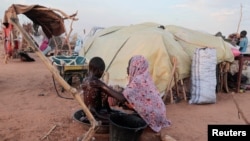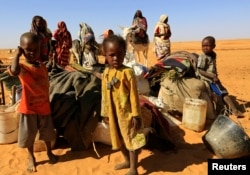The rate of malnutrition-related death in children displaced by violence in Sudan’s North Darfur region amounts to a humanitarian emergency, according to the findings of a new Doctors Without Borders (MSF) survey.
Since the war broke out between Sudan’s military and paramilitary forces in April 2023, around 300,000 people living in the Zamzam camp near North Darfur’s regional capital have been isolated from essential humanitarian aid and medical care.
In a statement Monday, MSF said it estimates that there are around 13 child deaths each day, according to the rapid nutrition and mortality assessment conducted in January. Their malnutrition is treatable if they can access a health care facility, but due to lack of resources many are left without support as their condition worsens.
Of the 400 households surveyed, MSF found a crude morality rate of 2.5 deaths per 10,000 people per day in the camp, double the number that is considered a threshold for a humanitarian emergency.
“Before the start of the conflict in April last year, people in the camp were heavily reliant on international support for food, health care, clean water—everything," said Claire Nicolet, head of MSF’s emergency response in Sudan. "Now, they have been almost completely abandoned. There have been no food distributions from the World Food Program since May. People are going hungry—and children are dying as a result.”
As the only health provider in Zamam camp, MSF said it intends to rapidly increase its work to treat children in critical condition but acknowledged that the disaster requires more resources than the organization can provide, including food, cash, health care, sanitation and water supplies.
Emmanuel Berbain, an MSF medical doctor in El Fasher, said that over the past nine months, the camp’s fragile healthcare system and humanitarian response has stopped working.
"This aid was abruptly halted, with roads and air supply routes severely hampered,” Berbain said. “The health system has collapsed, and staff no longer receive salaries; equipment and medicines are in short supply, along with fuel for generators, water, and other supplies to keep the health facilities running.”
Former programs to combat malnutrition in North Darfur are nonexistent and MSF is currently the only large international aid organization providing free pediatric care across all five of Sudan's Darfur states.
"Referrals for patients from Zamzam camp to the pediatric hospital in El Fasher happen on a daily basis to try and save children’s lives,” Nicolet said “But we know from the mortality assessment that there are hundreds of children who do not even reach us. It is possible to prevent the situation from deteriorating further through a massive mobilization of the international community. Without it, even more children will die preventable deaths."






